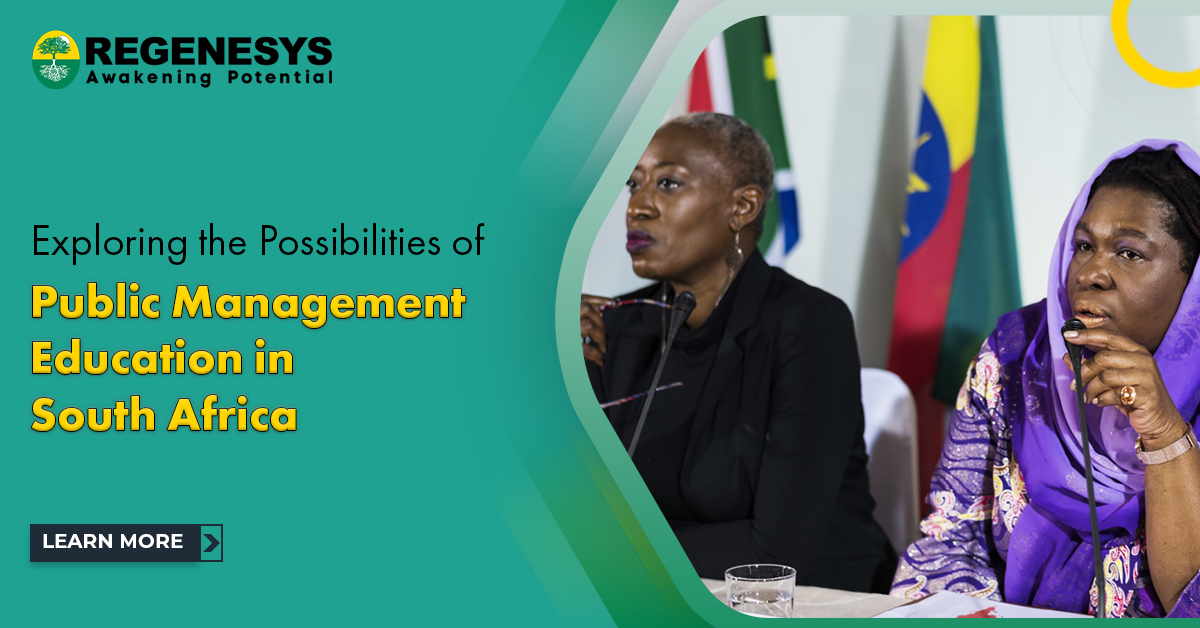Public management education plays a crucial role in shaping the future of South Africa.
As the country strives for economic growth, social development, and effective governance, it is essential to have a well-trained and knowledgeable pool of public managers who can address the complex challenges of the 21st century.
In this article, let us explore the future of public management education in South Africa and the key factors that will shape its development.
IN THIS ARTICLE:
- What is Public Management?
- What is Public Management Education?
- What is the future of Public Management Education in South Africa?
What is Public Management?
Public management refers to the systematic planning, organising, and directing of public sector entities, including government agencies, non-profit organisations, and international institutions.
Public management involves the efficient and effective utilisation of resources and the implementation of policies and programmes to achieve specific societal goals and meet the needs of the public.
Public management involves the strategic and ethical administration of public resources and services.
Effective public management is essential for building trust in government institutions and promoting the overall welfare of society.
A professional in public management plays a vital role in ensuring that
- Public organisations operate efficiently,
- Respond effectively to societal needs and
- Contribute positively to the well-being of communities and citizens.
What is Public Management Education?
Public Management Education refers to academic programmes and courses designed to provide students with knowledge, skills, and expertise in:
- Implementing public policies,
- Addressing societal challenges and
- Managing public sector organisations.
Public Management Education programmes are typically offered at various levels, including:
- Undergraduate,
- Graduate, and
- Postgraduate levels.
These educational programmes are offered in universities, colleges, institutions and business schools worldwide.
Public Management Education covers a broad range of topics related to
- Policy analysis,
- Public administration,
- Governing and managing public organisations.
What is the future of Public Management Education in South Africa?
Various factors, including societal needs, technological advancements, economic conditions, and global trends, influence the future of public management education in South Africa.
Here are several potential directions and considerations that could shape the future of public management education in South Africa:
Embracing Technological Advancements:
- The rapid advancements in technology have revolutionised every sector, and public management is no exception.
- In the future, public management education in South Africa will focus on equipping aspiring public managers with the necessary digital skills. It includes understanding and utilising:
- Big data,
- Blockchain,
- Artificial intelligence and
- Other emerging technologies.
- It helps enhance decision-making processes, improve service delivery, and promote innovative solutions to public challenges.
Enhancing Ethical Leadership:
- Ethical leadership is crucial for effective public management.
- In the future, public management education will place a greater emphasis on imparting ethical values and principles to aspiring public managers.
- It will help instil integrity, accountability, and transparency in public service, ensuring that public managers act in the best interest of the citizens they serve.
Emphasising Collaboration and Partnerships:
- Public management is becoming increasingly complex, requiring collaboration between various stakeholders, including government agencies, civil society organisations, and the private sector.
- The future of public management education in South Africa will focus on
- Managing partnerships,
- Fostering collaboration,
- Developing skills in building and
- Promoting multi-sectoral approaches to problem-solving.
- It will enable public managers to effectively navigate and leverage the diverse resources and expertise available to them.
Encouraging Diversity and Inclusion:
- South Africa is a diverse nation with multiple languages, cultures, and socio-economic backgrounds.
- The future of public management education will prioritise diversity and inclusion, ensuring that public managers have the necessary cultural competence to engage with diverse communities and address their unique needs effectively.
- It will promote social cohesion, inclusivity, and equitable development nationwide.
Strengthening Research and Evidence-Based Decision-Making:
- In the future, public management education will emphasise the importance of research and evidence-based decision-making.
- Public managers will be well-prepared to:
- Critically analyse data,
- Conduct rigorous research and
- Use evidence to inform policy and programme development.
- It will enhance the efficiency and effectiveness of public service delivery and ensure that decisions are based on sound evidence rather than arbitrary assumptions.
Promoting Continuous Professional Development:
- To keep up with the rapidly changing landscape of public management, continuous professional development will be crucial.
- The future of public management education will encourage lifelong learning and provide opportunities for public managers to update their knowledge and skills. These may include:
- Workshops,
- Short courses,
- Mentoring programmes and
- Networking events to foster ongoing professional growth.
The Bottom Line
The future of public management education in South Africa holds great promise.It is a critical topic that requires careful consideration. By focusing on:
- Continuous learning,
- Technology integration,
- Leadership development,
- Diversity and representation, and
- Innovative teaching methods.
Educational institutions can be crucial in preparing the next generation of public managers.
With a well-trained and diverse workforce, South Africa can effectively address the complex challenges of governance and public service delivery in the years to come.
Stay tuned with Regenesys School of Public Management to explore the future of Public Management Education in South Africa.
FAQs – Frequently Asked Questions: The Future Of Public Management Education In South Africa.
What are the crucial aspects of public management education?
Answer: One of the crucial aspects of public management education is preparing individuals for leadership roles in the public sector.
It includes developing their knowledge and skills in policy analysis, strategic planning, and public finance management.
To meet the demands of a rapidly evolving public sector, educational institutions must offer comprehensive programmes that provide students with a strong foundation in these areas.
What plays a crucial role in shaping the future of public management education in South Africa?
Answer: Collaboration and partnerships are crucial in shaping the future of public management education in South Africa.
By fostering relationships with other educational institutions, government agencies, and international organisations, public management programmes can ensure that their curriculum remains relevant and up-to-date.
Collaboration also provides opportunities for students to gain practical experience through internships and research projects, further enhancing their skills and knowledge.
What are the public management programmes offered by Regenesys School of Public Management?
Answer: The Regenesys School of Public Management offers both Undergraduate and Postgraduate programmes in public management.
Undergraduate programmes in public management include:
- Bachelor of Public Management (BPM),
- Higher Certificate in Public Management(HCPM),
- National Diploma in Public Administration (NDPA).
Postgraduate programmes in public management include:
Click here to learn more about the Regenesys Public Management programmes.
Why Public Management Education?
Answer:
Public Management Education is essential for several reasons, especially in public administration and governance.
Public Management Education can be vital in building a skilled and ethical workforce for the country’s public administration and governance.
Here are the key reasons why Public Management Education is crucial:
- Effective Governance,
- Community Development,
- Professional Development,
- International Development,
- Promoting Public Interest,
- Public Service Improvement,
- Crisis and Emergency Management,
- Building Sustainable Communities,
- Ethical and Accountable Leadership and
- Innovation and Problem-Solving skills.
What are the outcomes of the Public Management programme?
Answer: A Public Management programme fosters effective, ethical, and accountable public administration.
A Public Management programme prepares individuals to lead, innovate, and make decisions that positively impact society, promote social welfare, and contribute to the development and well-being of communities and nations.
Thus, Public Management professionals are educated in the principles of effective governance and social responsibility and play a crucial role in shaping a better future for all.







